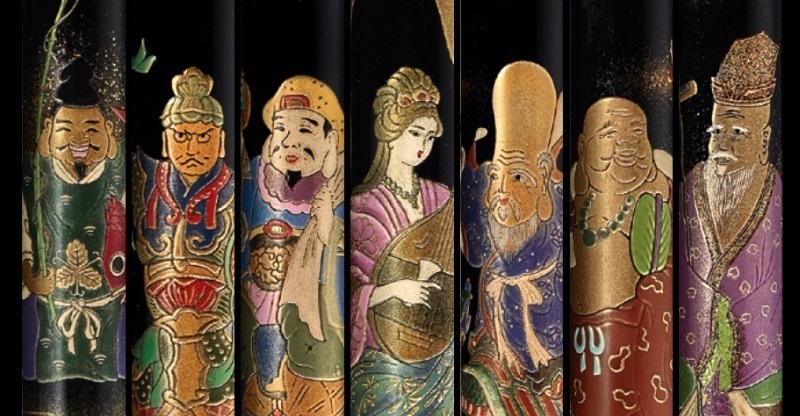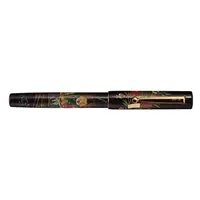Pilot 100th Anniversary SEVEN GODS PENS OF GOOD FORTUNE
Pilotfrom € 4858.20
Pilot 100th anniversary Ebisu

Coming soon
Find refills
Available colours
Available types
Pilot 100th Anniversary SEVEN GODS PENS OF GOOD FORTUNE

Seven artisans from the Kokkokai group contributed to the creation of these Fountain pens with clip, decorated on a Yukari shape.
They are all equipped with an 18 karats gold nib that highlights the engraving of the PILOT centenary.
Each model is made in Taka Maki-e and highlights one of the seven gods, among the most popular in Japan.
A woman and six men, who come from different religions (Shintoist, Buddhist, Taoist and Brahmanic) and from various geographical origins (Japanese, Chinese or Indian).
SEVEN GODS PENS OF GOOD FORTUNE:
EBISU: The only god to come from Japan.
His parents were the goddess Izanami and the god Izanagi. It is the god of prosperity, fishermen and merchants.
The body of the fountain pen is decorated with the traditional image of Ebisu holding a red snapper in his left hand and a fishing rod in the right one.
The pen cap is decorated with a bamboo branch (Fukuzasa) considered a lucky charm for companies.
DAIKOKUTEN: Embodiment of Shiva deity for Indian Hindu believers, he is the example of Ryobu Buddhism that reconciled indigenous Japanese traditions with Chinese Buddhism.
The body of the pen is decorated with Daikokuten sitting on a bundle of rice straw, carrying a large bag on his back and holding the magic mallet that grants wishes.
On the cap appears a mouse, symbol of numerous descendants.
BISHAMONTEN: The Samurais originally considered him as a god of war, and today, those who need luck in a chance competition worship him.
On the body of the pen, he wears an armor and he is trampling a maleficent demon.
He holds a spear in his right hand and a miniature stupa (sacred building that contains relics, often used as a place of meditation) in the left one.
The cap of the pen is adorned with the wheel of dharma, an auspicious symbol of Buddhist teaching.
BENZAITEN: The only woman among the seven gods and represents Japanese version of the Hindu deity Saraswati, goddess of water and sea.
Today she is revered as the god of wisdom, and is said to represent virtue in marriage.
The body of the pen is ornated with an image of Benzaiten playing Biwa (traditional Japanese lute) while on the cap an iridescent wave in raden (mother-of-pearl chips) recalls its links with water.
FUKUROKUJU: The three syllables of his name are also the three virtues of Taoism: fertility, health and longevity.
The body of the pen is decorated with an image of Fukurokuju recognizable by its elongated skull, white beard and large earlobes.
Standing on a turtle, symbol of longevity, which carries in its mouth a sacred roll, he holds a gem in his right hand.
On the hood, a crane brings him a cane.
JUROJIN: Known as the "Old Man of the South Pole", is a Chinese Taoist god. Incarnation of the southern polar stars, he is supposed to be the god of wealth and longevity.
On the body of the pen, Juro-jin smiling holds a cane on which a roll is pinned.
He is wearing a kimono printed with peaches.
On the cap, a deer symbol of longevity like the peaches accompanies it.
HOTEISON: Nicknamed the laughing Buddha, he is unique for being the only monk.
Assumed to be the incarnation of the Buddhist deity Maitreya Bodhisattva, Hoteison, which dates back to the Tang Chinese Dynasty.
On the body of the pen, he is represented with a cheerful smile, a plump face and a good paunch. On his shoulder, he carries a large canvas bag (Kannin-bukuro), supposed to contain the numerous treasures and blessings he distributes.
A mountain scenery adorns the hood.
Limited edition to only 150 pieces for each God.
